KATHMANDU: Shekhar Golchha is the President of the Golchha Organization, a reputed industrial house in the country.
Incumbent Senior Vice President of the Federation of Nepalese Chamber and Commerce (FNCCI), the umbrella organization of Nepal’s business houses, Golchha is all set to lead a new team as its President from mid-August.
Chief Editor of Khabarhub, Govinda Luitel had had a candid conversation with Golchha on issues related to the impact of coronavirus pandemic in the industrial and commercial sectors of the country. Excerpts:
How has the lockdown enforced to curb COVID-19 transmission affected the industry and commerce sector?
Lockdown came as an unprecedented event in our life. We witnessed a strict lockdown for around 3 months. Everything came to a standstill. The lockdown, currently, is partially waived off.
Nepal’s economy never witnessed such an incident before. We witnessed economic blockade; experienced the massive shock of the earthquake in 2015, and withstood the problems generated by the scarcity of power supply.
Besides, we overcame the days when there was regular Nepal bandh and the relationship between the workers and management, too, was at its lowest. The industrial sector went through tough days of insecurity.
There was a time when we could not get a license to run business; trade and industry had to run using ‘undue’ and unethical measures.
The country’s economy struggled against such an adverse situation for a quite long period. We, however, managed to overcome all such adversities of the past, though with the story of sacrifice and determination.
As our debt was not much in comparison with the Gross Domestic Product(GDP), the economy managed to come out of those difficult days. We spent a lot on general expenses but could not balance the development expenditure. We did not have the capacity for the utilization of development expenditure.
Our banking system is strong, however. The banks of the private sector, particularly, are strong. The non-performing assets (NPA) of our commercial banks are also in good condition. We run collateral-based and personal guarantee-based banking. We do not go for project-based banking. When the banks have less NPA automatically, they get strengthened.
The regulation of Nepal Rastra Bank is also quite effective here. When banks become strong, leverage can be utilized. This mobilizes and boosts the country’s economy.
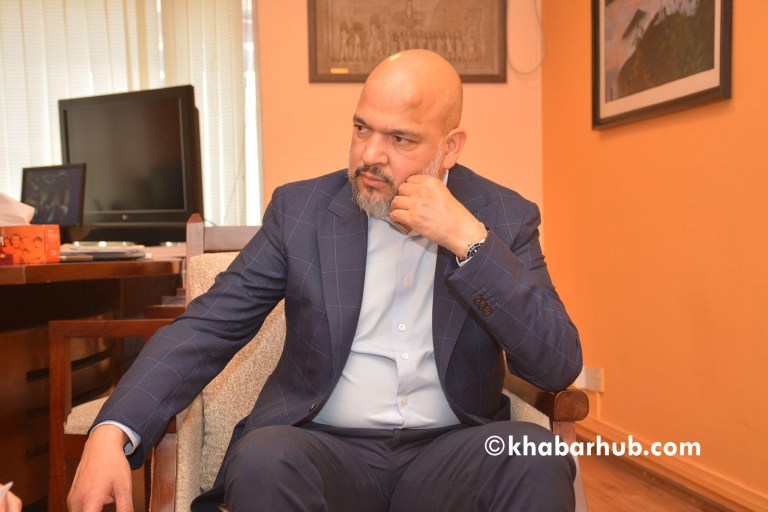
The main restrictions of the least developed countries like ours are the balance of payment status. When there is a big imbalance, the economy suffers. In such a situation, we do not have enough foreign currency for the procurement of most essential goods for the country.
We did not face such a situation before. Our youth contributed a lot through remittance which prevented the balance of payments deficits. We still have the stock of foreign currency for 12 months. This refers to the good health of the economy in this regard.
Thus, we managed to overcome past hurdles. Economically, Nepal is quite young. We are known for positivism and optimism. These strengths helped us overcome the challenges of the past.
However, the hazards that resulted from COVID-19 are quite different. The problem has been persisting for nearly 4 months now. The trade came to near nil during this period. This has caused a massive loss to the economy. The business came down nearly by 90%. It has unprecedented challenges in liquidity management.
Although by the end of the fiscal year, this time there has been no return from the market till mid-July. There are some expenses like tax, revenue, salary, and rent still lying due.
There are some difficulties with other expenditures as well. This has made liquidity management more challenging. Besides, there are problems in the loan sector as well.
Provided the government fails to introduce a stimulus package to mobilize the economy, our economy will be further affected. The economy cannot be recovered soon. Our inability to introduce a strong stimulus package and failure in liquidity management hampers economic recovery. That will further push the 7% growth-rate target of the Finance Minister away.
A large portion of employment is contributed to by the private sector. How has COVID-19 affected employment?
In fact, Nepal never felt any employment pressure in the past — neither in the government service nor in the private sector.
Youths used to go abroad and send remittance which would, ultimately, enhance the consumption. The remittance would increase the revenue and this would bear the expenses. There was a convenient formula. But, the situation is different now.
Though they did not get their desired jobs, there were very few who complained of not getting jobs at all. Getting skilled and semiskilled manpower was difficult, that’s why nearly 800 thousand Indians have been working in Nepal.
The situation in a different now. Most of the youths have started returning home. There are many Nepali youths in the Gulf countries where the economy is facing a hard time to COVID-19 and the fall of oil-price.
Nearly, 500 Nepali youths are likely to return home. The private sector here is supporting 3.5 to 4 million youths though with difficulty now.
It is estimated that around 500 thousand youths are likely to lose a job here in Nepal as well. Thus, just to balance it, the government and the private sector are under pressure to generate employment for nearly one million youth. What’s more, 500 thousand youths come to the job market every year adding more challenges.
Labor relation is slightly ‘derailed’ now, provided we failed to look at the challenges and promote the economic sector, we may face tougher days ahead.
When there is unemployment, there will be political instability and challenges in law enforcement. Nepal is likely to face such a situation.
What’s the main reason behind the decline of labor relations?
It’s related to the remuneration of the laborers. We had had a sort of understanding with the workers that we would pay half to those who could not work due to the lockdown and pay full to those who have been working even during the lockdown. But the government directed to pay 50% now and rest 50% later.
When the workers felt that they would get a full salary even if they do not work, they refrained from working. Who wants to take a risk when s/he is ensured of payment even if they did not work.
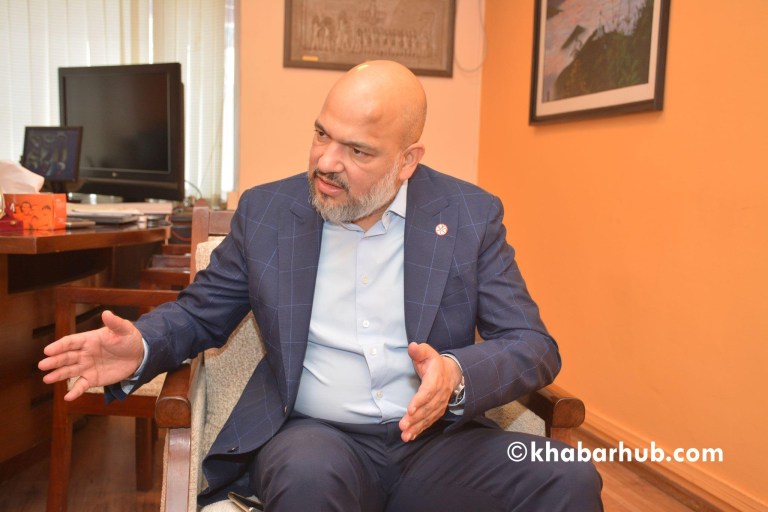
This disrupted the working environment. There was a scarcity of manpower. The industrial sector was compelled to pay 20-30%. Thus, the labor relation has declined. This is a matter of grave concern. The business has been disrupted badly.
There is no specific formula to generate employment. If problems like that of the cost of doing business are not addressed, the private sector cannot generate income opportunities. Generating employment takes time.
Foreign-returnees can be offered employment sharpening their skills. Many works done by the Indians can now be done by our youths as well. This can be a possible way out.
There is another way of tempting youths to agriculture. The youths are not attracted to this sector because there is no profit in this sector. The productivity of this sector is relatively less, hence, the government should launch some programs which can attract the farmers or the people interested in it.
The government programs should be on fixing the minimum price of the product, ensuring the availability of the market for the production, grants and soft loans, modernization of farming, terrace farming, integrated farming, etc.
It’s vital to ensure the guarantee of minimum profit to attract the youths towards this sector. Yet, it is not easy. Our economy has not got the momentum. Although the lockdown is relaxed, the economic activities have seen only a 50% revival.
The economic sector also depends on the mentality of the people. Due to the COVID-19 impact and long lockdown, people’s mentality has gone on a ‘saving mode’. Most of them are in the mood of economizing and managing with the old ones rather than preferring the new ones.
It’s a global trend now. There are many myths about coronavirus. People are still skeptical about this pandemic. None has constructed the house, none is purchasing mobiles or motorbikes; the trade and business have been stalled. Shops and malls are open, but there are no visitors. The economy cannot be mobilized if this situation persists.
Even if the lockdown is lifted soon, the economy is likely to suffer much longer. The government will not have any income. There will be more unemployed people coming to the streets. The problem is likely to get more complicated.
The government seemed concerned with the COVID-19 and imposed the lockdown. What is your observation?
Even during the prolonged lockdown, there was no scarcity of the most essential stuff. Even the price was controlled. It all became possible through the partnership of the government and the private sector. Nepal’s private sector has undertaken the responsibility with firmness.
It was not easy to retain the supply system in such difficult moments. Although the Supreme Court decree granted the private sector 30 days extra time after waiver of the lockdown, the private sector, as the most responsible sector in difficulties, supported the government by submitting the tax.
I had earlier taken to Twitter on this issue that went viral. I do not know the exact amount deposited in the government account in the form of revenue or tax. However, I have come to know that they have deposited more than government expectations.
Even during such an adverse situation, the private sector has supported the government. Those who are not in the position to pay at the time being, might not have paid. However, most of them have paid in a responsible way.
What should the government do to uplift tourism and other industries shrunk by the COVID-19 crisis? What are the things deemed most essential to uplift the economy?
The most important thing now is liquidity management. The government has to increase the development expenditure. The income it generates can be sent to the economy. Our economy is import-oriented. The trade deficit is at its extreme.
The cost of doing business is very high in the industrial sector. There is a problem with power. The government should give us power prior to selling it to India. The industry will undoubtedly get new investments. There will be more industries. We will be able to generate more employment opportunities.
The interest rate should be reduced. Poor infrastructure is another problem that makes the investment cost high. We should focus on infrastructure development to ensure the reduction of extra expenses. This will also reduce the production cost. Only then, can we be more competitive leading us to replace the import of goods and services.
Nepali youths prefer to work in a foreign land. They do not want to do the same types of jobs in Nepal because the country lacks labor dignity. Labor laws are not much strong as well. In collaboration with the private sector, these three things have to be reformed here.
The government should do these things and do these things instantly.
How do you take the COVID-19 induced crisis in the tourism sector?
The tourism sector is the worst hit. Tourism occupies nearly 8% of the national economy. It has generated employment opportunities as well. Nearly 400-500 thousand people are directly connected with the tourism industry. There are more involved in taxis, restaurants, party palace, hotels, trekking guides — all related to the tourism business.
The revival of the tourism sector may take more than 2 years. Possibilities of getting foreign visitors look slim. Domestic tourists also do not take the risk to travel. The hotels cannot operate well. This has caused a massive job cut in the tourism sector.
We recommend the government to take some special steps. Facilitation in re-loan, restructuring of loan or postponement of loan, discount in electricity charge, tax and in revenue are some of the measures the government needs to take.
There are problems in the hotel and airlines as well. Flights are stalled for four months now. The problem is turning chronic. The government has to consider it seriously.
There are complaints that the private sector did not keep its commitments regarding the Social Security Fund provisions. Has the private sector retreated from its commitment to this issue?
The trade union, the employees and the government, all three elements associated with it, need to collaborate to make the Social Security Fund a success. The unions have not shown much interest in the Social Security Fund.
When the trade unions themselves show slackness on such issues, naturally the employees also might not show much interest.
There are other issues related to it. We should understand why the workers show no interest in depositing the amount in the Fund.
There are some practical problems related to depositing the amount and the benefits they get from there. The workers and their unions are also not much encouraged to deposit their money in the Fund.
Neither the workers nor their unions have asked why their money is not deposited in the Fund to date. It hints at the fact that there are some problems. The government should resolve the issue. The private sector is always ready to collaborate and cooperate.
You are going to hold the top-post of the Federation of Nepalese Chambers of Commerce and Industry at a time when the country’s economic sector is going through a severe crisis. What’s your plan to help the business sector overcome this crisis?
Yes, soon, I am going to execute my duty as the President of FNCCI. Our constitution has the provision of promoting the Senior Vice President to the President automatically letting others compete for the Senior Vice President and other posts. The upcoming election is for the post of Senior Vice President and other posts. There will be a new team by mid-August.
Despite such provisions, attempts have been made to prevent me from holding the post of the President. We are in favor of making some amendments to the FNCCI statute. Many friends are looking for a change, but I will not let anyone take any political benefits from it.
I need to speak…I should speak out history. FNCCI has always remained a temple for me. It should not be forgotten that six entrepreneurs and businessmen assembled at the Khichapokhari-based Mira Home and discussed to establish a federation of the industrialists and entrepreneurs some 57 years ago.
My father Hulas Chand Golchha was also in that discussion. He was assigned the task of preparing the draft of the FNCCI statute.
He was affiliated with this organization for quite a long time. He became the Secretary and later the Vice President as well. Unfortunately, his health did not favor to compete for the post of the President.
Later Diwakar Golchha worked with the FNCCI, who later became a victim of a conspiracy and was deprived of the post of the President. Now, I have come to compete for it. I reiterate that there are several obstacles on my way.
Some friends even tried to amend the constitution just to deprive me of the post. I was restricted in many places for almost 3 years. With the help of some friends, I am getting this opportunity to lead this glorious organization as its President.
There are some ex-presidents threatening to dethrone me by tabling a no-confidence motion against me. They are criticizing and humiliating the incumbent and forthcoming President.
Despite such challenges, I am committed to make this organization a strong and respected organization that can work on behalf of the industrialist, entrepreneurs and business persons.


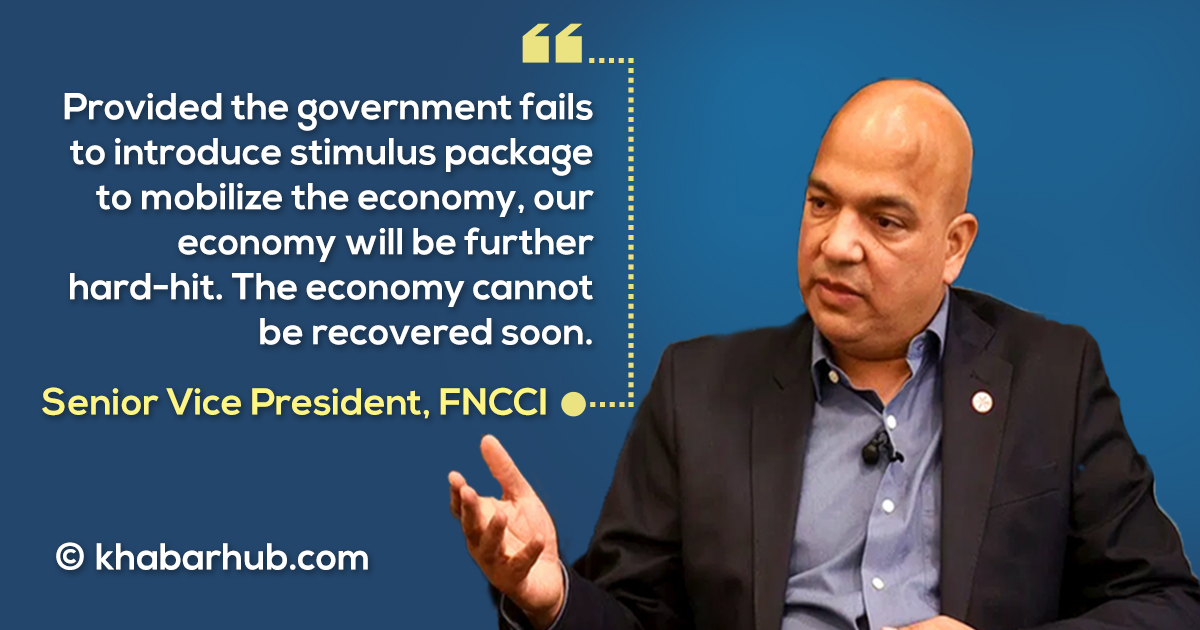



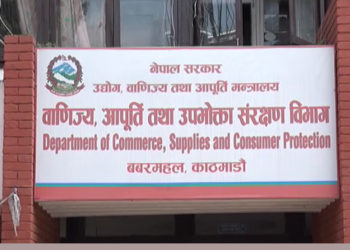
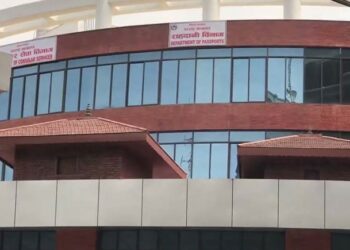

Comment